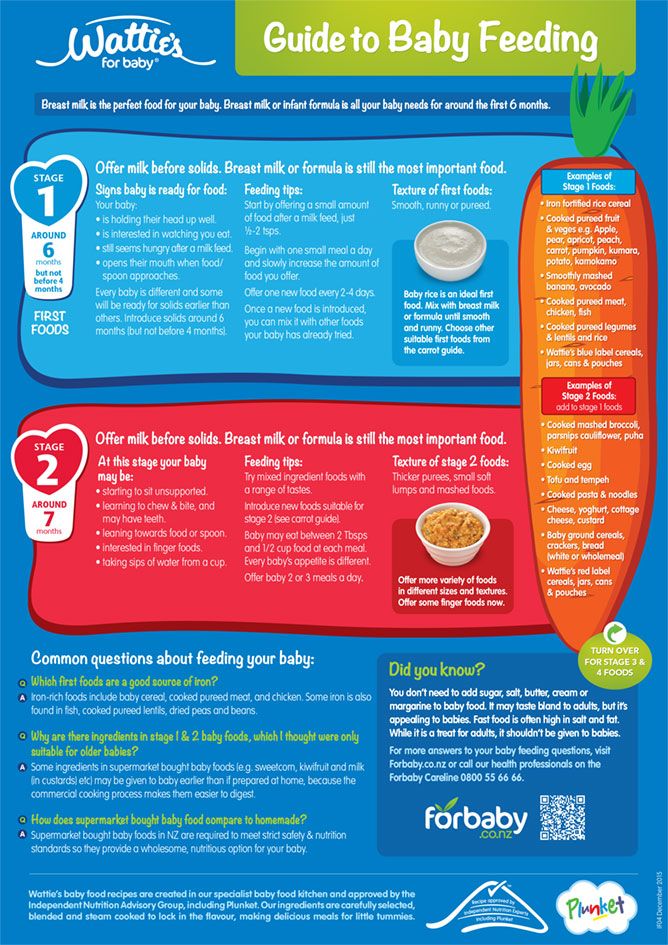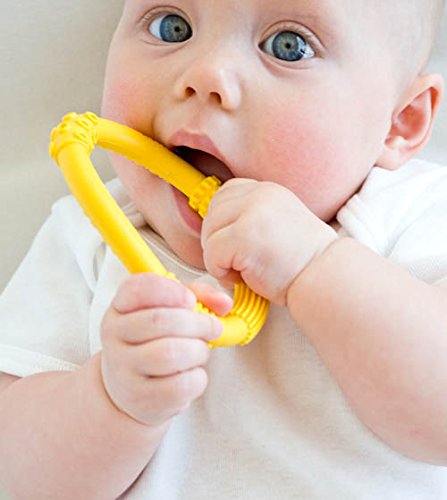Feeding specialist for babies
When Your Baby’s Not Eating Well, Feeding Therapy Can Help
Keywords
Holly Daniels Nelson
Babies are born hungry - but sometimes they have a little trouble learning to eat and swallow correctly. If your baby is having trouble with breast or bottle feeding, or as you introduce solid foods, if your baby seems to be a picky eater, a speech language pathologist or occupational therapist can help teach your baby how to eat better.
Kimberly Hirte, MA, CCC-SLP, pediatric speech language pathologist at Primary Children’s Rehabilitation Services at Intermountain Riverton Hospital in Utah recommends parents be aware of these symptoms:
Signs your baby may not be eating properly
- Is not gaining weight or growing
- Refuses to eat or drink
- Spits up or throws up a lot
- Cries or fusses, or arches her back when feeding
- Has trouble breathing while eating or drinking
- Has problems chewing or coughs or gags during meals
- Has a gurgle or breathy or hoarse voice during or after meals
When should you see a doctor or therapist about feeding problems?
”If your child has one of these symptoms or your child is only eating 5-10 different foods, is gagging or unable to transition to different textures of food, or mealtime is overly stressful, I would suggest a visit to a feeding therapist,” adds Hirte.
Conditions that may lead to feeding and swallowing disorders
- Being premature or having a low birth weight
- Reflux or other stomach problems
- Breathing problems such as asthma
- Cleft lip or palate
- Muscle weakness in the face and neck
- Medicines that make her sleepy or not hungry
- Autism or sensory issues
- Diagnoses like cerebral palsy, cystic fibrosis, Down’s Syndrome, meningitis
How speech therapists can help babies with feeding disorders:
”Pediatric feeding therapists are specially trained to help assess your child’s chewing skills and if they are moving their tongue correctly,” says Hirte. We can teach them to strengthen the muscles in their mouth and help them move their tongue effectively.”
We can teach them to strengthen the muscles in their mouth and help them move their tongue effectively.”
Therapists can help babies improve their ability to suck from a bottle or drink from a cup and coordinate breathing while eating. They can help older babies learn to chew properly and feed themselves.
“Some babies may have an aversion to certain textures of food. Therapists can help to make feeding time more enjoyable by changing food textures, liquid thickness, feeding positions or methods and can also offer suggestions to improve behavior during eating,” adds Hirte.
A speech or occupational therapist can evaluate your baby to find out what may be causing these issues and recommend treatment or therapy and help your baby enjoy meal time. There are therapists who see babies with feeding challenges at the Riverton Hospital Primary Children’s Outpatient Rehabilitation Clinic and other Intermountain clinics in Layton, Bountiful, Taylorsville, Riverton and Murray, UT.
What parents can do at home to help mealtime be less stressful
- Be positive, fun and creative.
- Offer your child a variety of colorful, age-appropriate, healthy food.
- Model good eating behavior: eat vegetables yourself, don’t eat while watching TV.
- Have a consistent mealtime routine.
- If your child doesn’t like a food, offer it another day. It may take several tries.
- Don’t force your child to eat or make them sit for long periods until they eat something.
- If you have a family history of food allergies, talk to your pediatrician before introducing foods that contain common allergens like milk, eggs, peanuts or gluten.
Tips for picky eaters
- Present food in a variety of ways. Try new containers, cups, utensils, tooth picks or even a muffin tin with several choices.
- Offer healthy foods with something fun to dip it in to encourage a variety of colors, textures and flavors.
 Some dip ideas are ranch salad dressing, hummus, nut butters or chocolate hazelnut spread.
Some dip ideas are ranch salad dressing, hummus, nut butters or chocolate hazelnut spread. - Cut food in shapes, use cookie cutters or arrange food in a shape.
- Let your child feed themselves. It will be messy!
- Encourage positive interactions with food using the five senses: seeing, feeling, smelling, tasting and even hearing the sound of crunchier foods can help them enjoy eating.
- Offer targeted, healthy choices: do you want your sandwich cut in squares or triangles? Do you want sweet potatoes or peas?
Pediatrics
Last Updated: 11/15/2018
-
Sports Medicine
-
Intermountain Moms
-
Intermountain Moms
-
Intermountain Moms
-
LiVe Well
-
LiVe Well
-
Pediatrics
-
LiVe Well
Copyright ©2022, Intermountain Healthcare, All rights reserved.
5 Signs Your Baby May Need Feeding Therapy
Almost every parent knows what it’s like to deal with a toddler who is a picky eater, but dealing with a baby or infant who seems to be particular about what they consume can be worrying for a parent. Being picky about food almost seems like a rite of passage during the toddler years but babies are almost always thrilled when they begin on solid foods, eager to express their likes or dislikes as they try new foods and flavors. While babies may often need to try new foods a few times before they truly enjoy them (we’re looking at you, mushy peas) sometimes there is a real problem that may require feeding therapy.
Contents
- What is feeding therapy?
- Not gaining weight or growing
- Feeding behavior
- Difficulties sucking and swallowing
- Lengthy mealtimes
- Refuses to try new foods
- What does a food therapist do?
- What can parents do?
If you’ve noticed that your baby is struggling to eat and mealtime is becoming more and more stressful, your baby may need feeding therapy. If you’re concerned that your mealtime battles are about more than just picky eating or food aversions and you’re concerned that your baby may not be getting proper nutrition, it may be time to seek professional help. Here are five signs that your baby may need feeding therapy.
If you’re concerned that your mealtime battles are about more than just picky eating or food aversions and you’re concerned that your baby may not be getting proper nutrition, it may be time to seek professional help. Here are five signs that your baby may need feeding therapy.
What is feeding therapy?
Feeding therapy is when a professional, typically a trained occupational therapist, speech therapist, or pediatric feeding specialist works with a family to get to the root cause of a baby or toddler’s feeding difficulties. They will then come up with specific therapies that will help the baby not only learn to eat better but to enjoy eating. There are some tell-tale signs all parents can be on the lookout for that can tell them if they should be seeking professional help.
Not gaining weight or growing
While a baby’s weight can often fluctuate, not gaining weight or growing, especially after starting solid foods can be a red flag that there may be an issue that could require feeding therapy, according to Intermountain Healthcare.
Feeding behavior
Arching the back while feeding, continually acting fussy at mealtimes, and spitting up or throwing up often while eating or drinking can also be signs that feeding therapy may be needed. “If your child has one of these symptoms or your child is only eating 5 to 10 different foods, is gagging or unable to transition to different textures of food, or mealtime is overly stressful, I would suggest a visit to a feeding therapist,” Intermountain Healthcare pediatric speech-language pathologist Kimberly Hirte explained.
Difficulties sucking and swallowing
RWJ Barnabas Health warns that abnormal sucking or swallowing can be a sign your baby may need feeding therapy. This can often mean that the baby is having trouble coordinating their sucking and swallowing with their breathing, which can result in not only poor feeding but labored breathing while they try to eat.
Lengthy mealtimes
Most parents have experienced some mealtimes that last longer than most, but Abilities in Action warns that mealtimes that consistently last longer than 30 minutes and/or are a struggle can be a warning sign.![]()
Refuses to try new foods
If your baby refuses to try new foods or often pushes food away, it may be a sign your baby needs feeding therapy, notes Children’s Health Orange County (CHOC).
What does a food therapist do?
Food therapists can work with you and your baby to help them develop the skills needed to eat and drink properly. They can help babies learn to breathe while sucking from a bottle or drinking from a cup as well as help older babies who are transitioning to solid foods learn how to chew properly and feed themselves. “Pediatric feeding therapists are specially trained to help assess your child’s chewing skills and if they are moving their tongue correctly,” Hirte added. “We can teach them to strengthen the muscles in their mouth and help them move their tongue effectively.”
She also noted that for babies who have aversions to different textures, “therapists can help to make feeding time more enjoyable by changing food textures, liquid thickness, feeding positions or methods and can also offer suggestions to improve behavior during eating. ”
”
What can parents do?
It can be incredibly stressful for a parent or caregiver of a baby who is struggling with eating and drinking. While we assume that the ability to eat and drink normally should come naturally, that simply isn’t always the case. A food therapist will not only work with your baby but will also help teach parents and caregivers the tools they need to help outside of therapy. A food therapist will work as a team with parents and caregivers to ensure the baby gets all the support and help they need to help improve their feeding habits.
According to CHOC, feeding therapists will teach parents and caregivers feeding strategies and provide general advice for eating at home, tactics for addressing negative mealtime behaviors, how to continue encouraging the child to eat the new foods introduced during therapy at home, and how to keep a food log of what the child eats and how he or she acts at mealtime and reacts to foods.
Feeding difficulties are more common than many may think. According to one source, 25 percent of all children will experience feeding difficulties during infancy and early childhood and if left untreated these feeding difficulties can affect their overall health and development. If you’re concerned your baby may be experiencing issues feeding speak to your doctor and see if an evaluation by a feeding therapist may help.
According to one source, 25 percent of all children will experience feeding difficulties during infancy and early childhood and if left untreated these feeding difficulties can affect their overall health and development. If you’re concerned your baby may be experiencing issues feeding speak to your doctor and see if an evaluation by a feeding therapist may help.
Editors' Recommendations
- Can you get your nails done while pregnant? These are the factors to consider
- These are the four best high-protein baby foods
- Why brushing your baby’s hair should be part of your daily routine
- Your questions answered – Everything you need to know about baby-led weaning
- Feeding toddlers when sick: What to feed a toddler with a fever
Breastfeeding advice: experienced doctors will share their opinion and suggest how to do it right
Breastfeeding advice is essential for almost every new mother. The help of an experienced specialist helps to ensure a complete healthy diet for the newborn, which is the key to the normal growth and development of the crumbs. Breastfeeding is one of the most important elements in the formation of a baby's health. But there are a number of problems that many women face. They may suffer from cracks and engorgement of the nipples, soreness, nervousness and tearfulness of the child, falling asleep in the process. Such problems often arise due to incorrect or insufficient awareness of the mother. Eliminate them and help professionals.
The help of an experienced specialist helps to ensure a complete healthy diet for the newborn, which is the key to the normal growth and development of the crumbs. Breastfeeding is one of the most important elements in the formation of a baby's health. But there are a number of problems that many women face. They may suffer from cracks and engorgement of the nipples, soreness, nervousness and tearfulness of the child, falling asleep in the process. Such problems often arise due to incorrect or insufficient awareness of the mother. Eliminate them and help professionals.
Consultants conduct individual trainings, within which:
- Finding the right position for a new mother to feed
- Demonstrate how to properly apply the baby
- Explain the importance of skin contact between mother and baby
Why is breastfeeding important?
Such feeding ensures the harmonious intellectual, physiological and psycho-emotional development of the child, prevents the risks of developing infectious, inflammatory and other diseases, reduces the likelihood of infant mortality due to pneumonia, diarrhea and other pathological conditions. Children who have grown up on mother's milk become more independent and confident, in the future they suffer less than their peers from asthma, childhood leukemia, necrotizing enterocolitis, ear infections, obesity, allergies, type 1 and type 2 diabetes.
Children who have grown up on mother's milk become more independent and confident, in the future they suffer less than their peers from asthma, childhood leukemia, necrotizing enterocolitis, ear infections, obesity, allergies, type 1 and type 2 diabetes.
In addition, breastfeeding contributes to the health of the woman herself. The process allows:
- Reduce the risk of developing breast and ovarian cancer
- Reduce the likelihood of cardiovascular disease
- Stabilize mental health after childbirth
- Improve quality of life
Breastfeeding allows you to provide natural contraception for 5-6 months after childbirth. The menstrual cycle with a regular diet of crumbs does not resume. A slender figure is also guaranteed (in the absence of concomitant pathologies). About 400-500 calories per day are spent on feeding. This is especially true for women who gained excess weight during pregnancy, but for some reason cannot start going to the gym. Breastfeeding also provides an opportunity to reduce financial costs. Quality blends of well-known brands are quite expensive. During lactation, a woman receives a sufficient amount of free time. The child is less sick, does not require complex care and treatment.
Breastfeeding also provides an opportunity to reduce financial costs. Quality blends of well-known brands are quite expensive. During lactation, a woman receives a sufficient amount of free time. The child is less sick, does not require complex care and treatment.
When switching to artificial mixtures or with improper feeding in a baby:
- Impaired immunity
- Obesity may occur
- Gastroenteritis and enterocolitis occur
- Other pathologies develop
Women face:
- Pain while suckling at the breast
- Lactostasis
- Mastitis
- Loss of milk
- Rapid weight gain
- Risk of developing diabetes and metabolic syndrome
In addition, the likelihood of unwanted pregnancy, the development of cancer, and the occurrence of postpartum depression increases.
When do I need advice on breastfeeding?
You need to use the services of professionals in the following cases:
- If the child is naughty, refuses to eat, bites, cries or falls asleep
- If there are problems with the chair
- When baby spit up milk
- Premature newborn
- Birth of twins or triplets
- Milk stasis, deficiency or excess
- For sore breasts, retraction, engorgement and cracking of the nipples
- For asymmetric changes in the size of the mammary glands
- If the newborn is obese or underweight
Also, consultants will provide support if a young mother is forced to go to work or leave home for a long time for other reasons, wants to stop feeding her child.
Important! In some cases, you should contact mammologist surgeons. Such specialists help with severe pain, the appearance of redness and induration in the mammary glands, the discharge of pus from the nipples, an increase in the overall body temperature, and an increase in the lymph nodes in the armpits. Make an appointment as soon as possible, as such conditions are dangerous to health.
What will the lactation specialist do when he arrives at home?
The consultant will assess the situation and develop a further action plan. The specialist will show how to properly feed the child, help to work out the technique of the process. If necessary, he will teach the young mother to use special devices. As a rule, the visit of a professional lasts 1-2 hours. The time of the visit must be agreed in advance. It should coincide with the feeding period.
Consultant:
- Studying mother's behavior, listening to her complaints, answering questions
- Assesses the infant's well-being and behavior, weight gain, type of stool and amount of urine produced
- Examines the mammary glands of a woman
- Selects the optimal postures that are comfortable for both mother and baby
- Conducts a feeding master class
- Teaches you how to take care of your breasts
- Explains how to prevent complications
- Helps in choosing comfortable bras
- Composes an individual diet for a breastfeeding woman
- Talks about taking medications and eating certain foods
Calling a specialist at home.
 Service benefits
Service benefits Consulting a breastfeeding specialist at home has many benefits. These include:
- Familiar home environment
- Possibility of a visit at a convenient time
- No need for a long wait
By calling a specialist at home, you do not have to go with your child to a medical facility, sit in a queue, and expose your baby to the risk of contracting various diseases. A professional will be able to give maximum attention to all existing problems. If necessary, not one, but several consultations are held. The specialist can come as many times as necessary.
Benefits of contacting MEDSI
- Complete consultations on breastfeeding. MEDSI specialists will not only tell you about all the rules, but also help prevent complications arising from the wrong actions of a young mother
- Possibility of leaving the house. A specialist can come to you when it is most convenient. Home use will eliminate stiffness and other restrictions.
 This will create an atmosphere of trust
This will create an atmosphere of trust - Experienced consultants. Our specialists have been working for a long time, constantly improving their skills, applying modern methods and techniques
- Joint work of several professionals. If necessary, you can also seek support from our other doctors
- Ability to diagnose potential pathological conditions. All examinations in MEDSI can be completed as soon as possible
If you want to clarify the price of a breastfeeding consultation or seek the help of professionals, call +7 (495) 7-800-500.
How to get help with breastfeeding | help with breastfeeding
Many mothers need help with breastfeeding, especially in the first days after giving birth. Where can you get it?
Share this information
Some mothers breastfeed easily, but many need help. There are many ways to avoid problems and start breastfeeding successfully.
Before the birth of a child
Every mother-to-be would do well to take courses for pregnant women. In these courses, you will learn the importance of skin-to-skin contact in triggering milk production and receive other helpful breastfeeding tips. The course leader can provide you with a list of local lactation consultants and breastfeeding support groups. If the manager does not have this information, find out about local specialists, hotlines and support services yourself.
Be sure to include breastfeeding and early skin-to-skin contact with your baby in your birth plan. It is important that the medical staff is aware of your wishes.
Who can provide breastfeeding support?
Seek help immediately after giving birth if you need it. Small problems can quickly turn into big ones, but most of them are easy to fix if you take action right away.
Medical professionals such as obstetricians, nurses and physicians often have basic breastfeeding training. If you have more complex problems, you should contact professionals with a narrow specialization. These are lactation consultants (including self-help and breastfeeding support professionals).
If you have more complex problems, you should contact professionals with a narrow specialization. These are lactation consultants (including self-help and breastfeeding support professionals).
Self-help members
These are mothers who have experienced breastfeeding and have been trained to help with common problems. They can assess whether the baby is latching on well and getting enough milk. If the grip is wrong, they can suggest a more comfortable position for feeding. For more serious problems, they can recommend a qualified technician.
Breastfeeding support specialists
Breastfeeding support professionals (eg, La Leche Liga, AKEV) have more knowledge and can help with more serious problems, such as if the baby is not gaining enough weight or does not want to latch on.
Lactation Counselors
Lactation Counselors help with more complex problems. It can diagnose insufficient milk production and assist with breastfeeding premature babies.
What problems can experts help with?
Here are some of the most common breastfeeding problems and links to detailed articles on them.
Latching problems
Ideally, a newborn baby will be able to latch on by himself in the first few hours of life. If this does not happen, or if the latch makes you uncomfortable, the obstetrician or self-help member can check that you are properly latching on to your baby. If the maternity hospital has already performed such a check, but the problem has not been solved, do not hesitate to ask for it again. If the baby does not take the breast after a day, and you have already been discharged from the hospital, contact a consultant for further support. Read more in the article on the correct grip on the chest.
Sore nipples
This problem is almost always due to the fact that the baby does not latch on properly. A member of the self-help movement or a breastfeeding support specialist will suggest a better position for the baby. If you experience severe pain or inflammation that does not go away even after changing position, seek the help of a consultant to find out the cause. Read more in the article about sore nipples.
If you experience severe pain or inflammation that does not go away even after changing position, seek the help of a consultant to find out the cause. Read more in the article about sore nipples.
Breast swelling
The best way to avoid breast swelling (a condition that occurs on the second or fourth day after birth, when the breasts fill up and harden from incoming milk) is to feed your baby often. Your lactation consultant will teach you how to massage your breasts and how to express milk manually or with a breast pump to help relieve discomfort. If you are unable to breastfeed your baby due to swelling of the mammary glands, you should consult an obstetrician. Read more in the article about swelling of the mammary glands.
Problems with milk production
Many mothers in the first days after giving birth worry that they are not producing enough milk. A self-help member, obstetrician or nurse will help you calm down and explain that during this period it is perfectly normal for a child to ask for a breast every one to two hours.











